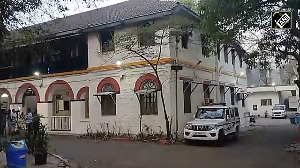The Koreans were expected to win their fourth league match at the hockey World Cup rather easily, but the Indians put up a good fight and stretched them before going down 1-2.
Except for a couple of matches, all the league matches have been very close. Monday's match was no exception. Shivender Singh got the lead for India. He seems to be at the right place, at the right time, and that is making him tick. He is not afraid to use his skills and take chances in the semi-circle and 23-metre area.
But for all the enterprise Shivender has shown, the team hasn't been able to withstand pressure.
As the Indians approach the last ten minutes of the match it appears that they suddenly start to panic, in the process conceding soft penalty-corners and temporary suspensions. It is my guess, but I think they must be having the distinction of picking the maximum yellow cards -- three in four matches. If you look back, the suspensions have had its toll on the team, because goals were conceded during that period when the team was reduced to ten men.
I am sure coach Bhaskaran must be livid with his boys for losing focus at very crucial stages. After all, one can lead a horse to the pond but cannot make it drink!!
Korea were unable to counter goalkeeper Adrian D'Souza's strategy of running out to the top of the 'D' to challenge the striker for almost all the penalty-corners Korea forced, till Jong Hyn Jang unleashed two powerful drag flicks that proved decisive.
Indian team has always been at the receiving end of umpires. The ongoing World Cup is no different. In no way one is making an attempt to defend the team after the string of defeats, but is intriguing how some decisions are interpreted.
On Monday, a good combined move between Shivender and Tushar Khandekar in the dying moments of the game beat the Korean goalkeeper, and when Tushar had a try at goal, a Korean defender blocked his goal-bound shot deliberately. The offence, in my opinion, should have been a penalty-stroke. The intention was clearly visible, but umpire Adel thought otherwise and awarded a penalty-corner.
Rule 14.3 clearly states that a penalty-stroke shall be awarded for:
a) An "intentional offence" by a defender in the circle to prevent a goal being scored or to deprive an attacker of actual or "likely" possession of the ball.
b) An "unintentional offence" by the defender in the circle that prevents the "probable scoring of a goal".
I personally feel the umpires need to be accountable and explain the reasons thereof for some of their 'crucial decisions'. If they cannot justify their actions, they too should be penalized with a 'yellow card' after receiving a 'green'. After all, no team would like to be done in by inconsistent umpiring.
Mervyn Fernandis represented India at the 1980, '84 and '88 Olympics. He also captained India at the junior World Cup in Versailles, France, in 1979.
Previous columns:







 © 2025
© 2025